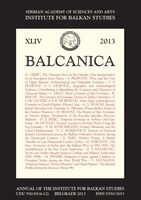BALCANICA
BALCANICA
Publishing House: Balkanološki institut - Srpska akademija nauka i umetnosti
Subject(s): Politics / Political Sciences, History, Social Sciences, Language and Literature Studies, Law, Constitution, Jurisprudence, Fine Arts / Performing Arts, Theology and Religion
Frequency: 1 issues
Print ISSN: 0350-7653
Online-ISSN: 2406-0801
Status: Active
- 1999
- 2001
- 2003
- 2004
- 2005
- 2006
- 2007
- 2008
- 2009
- 2010
- 2011
- 2012
- 2013
- 2014
- 2015
- 2016
- 2017
- 2018
- 2019
- 2020
- 2021
- 2022
- 2023
- 2024
- 2025
- Issue No. 30-31
- Issue No. 32+33
- Issue No. 34
- Issue No. 35
- Issue No. 36
- Issue No. 37
- Issue No. 38
- Issue No. 39
- Issue No. 40
- Issue No. 41
- Issue No. 42
- Issue No. 43
- Issue No. 44
- Issue No. 45
- Issue No. 46
- Issue No. 47
- Issue No. 48
- Issue No. 49
- Issue No. 50
- Issue No. 51
- Issue No. 52
- Issue No. 53
- Issue No. 54
- Issue No. 55
- Issue No. 56
Articles list
{{ article.TitleOriginalLanguage }}
{{ article.TitleOriginalLanguage }}
({{ article.TitleEnglish }})
- Publication: {{ article.Publisher }} ({{ article.Issue }})
- Author(s): {{ article.Authors }}
- Contributor(s): {{ article.Contributors }}
- Language: {{ article.Language }}
- Subject(s): {{ article.Subjects }}
- Issue: {{ article.Issue }}
- Page Range: {{ article.PageRange }}
- No. of Pages: {{ article.NumberOfPages }}
- Keywords: {{ article.Keywords }}
- Summary/Abstract: {{ article.SummaryAbstract }}
- Price: {{ common.currency(article.Price) }}
Short Description
The origin of the Institute goes back to the Institut des Études balkaniques founded in Belgrade in 1934 as the only of the kind in the Balkans. The initiative came from King Alexander I Kargeorgevic, while the Institute’s scholarly profile was created by Ratko Parezanin and Svetozar Spanacevic. It published Revue internationale des Etudes balkaniques, which assembled most prominent European experts on the Balkans. Its work was banned by the occupation authorities in 1941. The institute was restarted only in 1969 under its present-day name and under the auspices of the Serbian Academy of Sciences and Arts. It assembled a team of scholars to cover the Balkans from prehistory to the modern age and in a range of different fields of study such as archaeology, ethnography, anthropology, history, culture, art, literature, law. This multidisciplinary approach has remained its long-term orientation. The Institute has established international cooperation with a number of institutions in Europe. It has organized several dozen international conferences, publishes its annual Balcanica and its Special editions covering all fields of Balkan studies.

